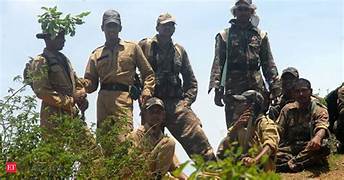PM Modi Terms Surge in Defections a “Turning Point for Peace and Development in Bastar”
Published on: November 08, 2025
By: BTNI
Location: Bastar, India
In a major breakthrough in the fight against left-wing extremism, more than 300 Maoists surrendered across the Bastar region within just 24 hours, marking one of the largest waves of defections in recent years. Prime Minister Narendra Modi, speaking at the NDTV World Summit 2025, hailed the development as “a decisive step toward restoring peace, stability, and progress in Chhattisgarh.”
Among the latest surrenders is Geeta alias Kamli Salam, a prominent woman Maoist commander from Kondagaon, who had been active in recruitment and logistics for over a decade. Her surrender is seen as highly symbolic, as women have historically formed the core communication and ground support network of Maoist groups. Officials report that in the past year alone, over 40% of surrendered cadres have been women, signaling deep cracks within Maoist ranks.
The defections span Kondagaon, Narayanpur, Bijapur, Dantewada, and Sukma, regions that have witnessed heavy violence over the past several decades. The surge comes as security forces intensify operations under ‘Operation Prahar’, a coordinated drive led by the CRPF, DRG, BSF, and state police units, which targets core Maoist-occupied zones, including parts of Abujhmad, considered a long-standing rebel stronghold.
Since the BJP government assumed office in January 2024, Chhattisgarh has recorded:
- 2,100+ Maoist surrenders
- 1,785 arrests
- 477 killed in encounters
Officials attribute the mass surrenders not only to sustained operations, but also to expanded rehabilitation packages, offering:
- Cash incentives up to ₹5 lakh
- Skill development and vocational training
- Priority employment placement under the state’s new industrial and rural development policies
Union Home Minister Amit Shah’s recent strategic review in Raipur, where he interacted with BSF and CoBRA commandos, has also boosted morale among forces. Meanwhile, civilian casualties from Naxal violence have dropped dramatically—from 71 in 2024 to just 24 in 2025 so far—the lowest in more than two decades.
Also read- https://www.btnewsindia.com/prime-minister-narendra-modi-addresses-the-nation-on-the-150th-anniversary-of-vande-mataram/ https://www.btnewsindia.com/farmers-appreciate-agriculture-departments-exhibition-on-crop-rotation-at-rajyotsav-fair/
Chief Minister Vishnu Deo Sai welcomed the development, calling it a “victory of development over destruction.” He emphasized that the state is now focusing on tribal livelihood programs, road connectivity, forest rights implementation, and education access to ensure long-term peace.
However, security experts caution that the government must maintain strict monitoring to prevent recidivism, as some former cadres in the past have returned to Maoist networks. Yet, with the Maoist cadre strength now reportedly reduced to fewer than 1,000 active members, officials believe the insurgency is at its weakest point in decades.
As the region moves forward, administrative and community-led initiatives—such as forest science centers, self-help cooperatives, and winter kit distribution in interior villages—are helping rebuild trust and shift Bastar’s narrative from conflict to sustainable development.




